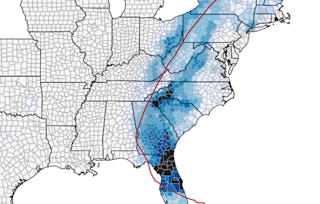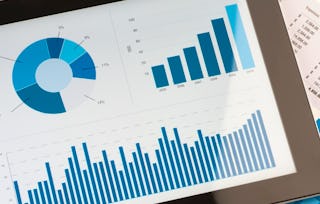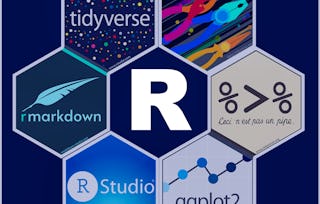This course provides a rigorous introduction to the R programming language, with a particular focus on using R for software development in a data science setting. Whether you are part of a data science team or working individually within a community of developers, this course will give you the knowledge of R needed to make useful contributions in those settings. As the first course in the Specialization, the course provides the essential foundation of R needed for the following courses. We cover basic R concepts and language fundamentals, key concepts like tidy data and related "tidyverse" tools, processing and manipulation of complex and large datasets, handling textual data, and basic data science tasks. Upon completing this course, learners will have fluency at the R console and will be able to create tidy datasets from a wide range of possible data sources.

The R Programming Environment

The R Programming Environment
This course is part of Mastering Software Development in R Specialization


Instructors: Roger D. Peng, PhD
53,261 already enrolled
Included with
1,167 reviews
Skills you'll gain
Details to know

Add to your LinkedIn profile
4 assignments
See how employees at top companies are mastering in-demand skills

Build your subject-matter expertise
- Learn new concepts from industry experts
- Gain a foundational understanding of a subject or tool
- Develop job-relevant skills with hands-on projects
- Earn a shareable career certificate

There are 7 modules in this course
In this module, you'll learn the basics of R, including syntax, some tidy data principles and processes, and how to read data into R.
What's included
1 video27 readings
What's included
1 assignment1 programming assignment
During this module, you'll learn to summarize, filter, merge, and otherwise manipulate data in R, including working through the challenges of dates and times.
What's included
11 readings
What's included
1 assignment1 programming assignment
During this module, you'll learn to use R tools and packages to deal with text and regular expressions. You'll also learn how to manage and get the most from your computer's physical memory when working in R.
What's included
9 readings
Choice 1: Get credit while using swirl | Choice 2: Get credit by providing a code from swirl
What's included
1 assignment1 programming assignment
In this final module, you'll learn how to overcome the challenges of working with large datasets both in memory and out as well as how to diagnose problems and find help.
What's included
7 readings1 assignment
Earn a career certificate
Add this credential to your LinkedIn profile, resume, or CV. Share it on social media and in your performance review.
Instructors


Offered by
Explore more from Data Analysis
 Status: Free Trial
Status: Free TrialJohns Hopkins University
 Status: Preview
Status: PreviewMicrosoft
 Status: Free Trial
Status: Free TrialUniversity of Colorado Boulder
 Status: Free Trial
Status: Free Trial
Why people choose Coursera for their career

Felipe M.

Jennifer J.

Larry W.

Chaitanya A.
Learner reviews
- 5 stars
59.12%
- 4 stars
24.85%
- 3 stars
7.71%
- 2 stars
3.34%
- 1 star
4.97%
Showing 3 of 1167
Reviewed on Sep 13, 2021
Great Introduction, may we worth clarifying that for Data Manipulation the script must be saved before entering submit() as you cannot make progress.
Reviewed on Jun 10, 2020
Overall, it is an excellent course. However, there was a big difference in terms of difficulty between the quizzes, especially with the last one.
Reviewed on Jul 22, 2019
What I liked most about this course was that it gave us a solid foundation on how to program in R and at the same time made us want to learn more about it.

Open new doors with Coursera Plus
Unlimited access to 10,000+ world-class courses, hands-on projects, and job-ready certificate programs - all included in your subscription
Advance your career with an online degree
Earn a degree from world-class universities - 100% online
Join over 3,400 global companies that choose Coursera for Business
Upskill your employees to excel in the digital economy
Frequently asked questions
To access the course materials, assignments and to earn a Certificate, you will need to purchase the Certificate experience when you enroll in a course. You can try a Free Trial instead, or apply for Financial Aid. The course may offer 'Full Course, No Certificate' instead. This option lets you see all course materials, submit required assessments, and get a final grade. This also means that you will not be able to purchase a Certificate experience.
When you enroll in the course, you get access to all of the courses in the Specialization, and you earn a certificate when you complete the work. Your electronic Certificate will be added to your Accomplishments page - from there, you can print your Certificate or add it to your LinkedIn profile.
Yes. In select learning programs, you can apply for financial aid or a scholarship if you can’t afford the enrollment fee. If fin aid or scholarship is available for your learning program selection, you’ll find a link to apply on the description page.
More questions
Financial aid available,

